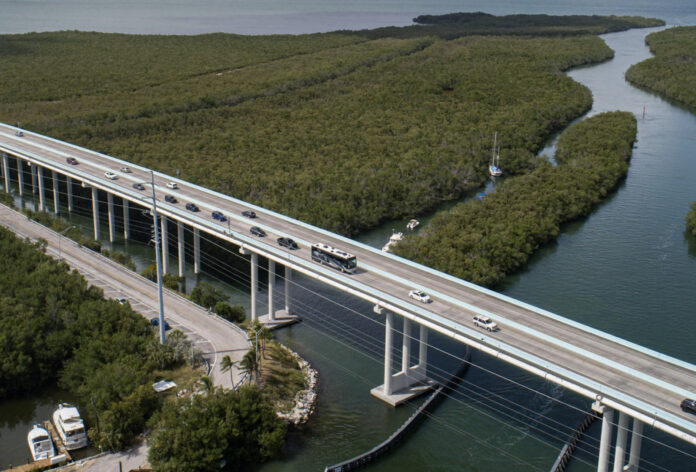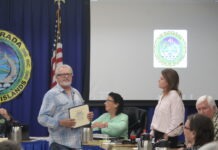
Monroe County Commissioners are taking steps to ask voters in November 2024 to adopt a charter county form of government, which is essentially creating a new Keyswide constitution.
The idea is in the early discussion stages, with nothing on paper yet. But some elected leaders say they already have reason to be wary.
Marathon Mayor Luis Gonzalez said he’s waiting to hear the pros and cons of how a charter county government would affect his city and hasn’t made up his mind. Still, he has one basic question.
“We incorporated 20 years ago for the purpose of standing alone, and is this a way of us losing some of our stand-alone power?” Gonzalez said.
But the five members of the county commission say they’re not planning a power grab; rather, they’re searching for a way to pay for the Florida Keys’ widespread needs for transportation repairs, upkeep and raising roads in the low-lying areas that routinely flood with saltwater.
“Our bridges, our roads, all those things need attention,” County Attorney Bob Shillinger said, during a presentation at the commission’s Sept 20 meeting in Key Largo, after being directed to begin the work to draft a charter.
“Those things require money to deal with that,” Shillinger said, of transportation issues. “This is a potential funding source to help address those needs, the county charter transportation surtax.”
Who would pay a ‘transportation tax’?
The plan remains in an early discussion stage. The target date for the vote is the general election set for Nov. 5, 2024, which is also a presidential election.
All Monroe voters would have a say at the polls, just as those in municipalities can vote for county commission.
The transportation tax, limited to 1 percent, would likely add up to multiple millions a year that the Keys could count on for roads, county leaders say. Tourists would pay two-thirds of the tax, Shillinger said.
That math was verified during the 2020 tourism shutdowns due to the COVID-19 pandemic, he said.
“If someone has a better idea, we’re all ears,” Shillinger said.
No one presented another idea during the commission’s Sept. 20 meeting other than opposing the charter idea.
“It is doomed to failure, it will not pass,” said Patrick Foley of Islamorada. “The only purpose that I can see is primarily to raise taxes.
Commissioner David Rice, of Marathon, told Foley that tourists will pay most of it, rather than the county’s 80,000 residents.
“You want your roads fixed and your bridges fixed and things like that, you’ve gotta have money,” Rice told Foley. “We have some horribly expensive problems in this county.”
Foley stuck with his opinion, as he wore a yellow T-shirt with the words, “Fix the Road,” a reference to the longtime street flooding in Key Largo neighborhoods.
“Tourists may pay some part of it but you’re raising my taxes as well,” Foley said.
Too early to call
Monroe County commissioners directed Shillinger to change as little as possible in the charter draft ordinance. A charter could be written so that it trumps those in municipalities.
“You said, ‘Don’t do that,’” Shillinger said. “Don’t be surprised if you see the same system that we have now come out in the draft.”
In Florida, 20 counties have charters that give them the authority to act directly from the state constitution and not indirectly through the legislative system currently in place in Monroe.
In 1957, the Miami-Dade County Home Rule Charter was adopted, “essentially becoming the ‘constitution’ for Miami-Dade County,” its website reads. Wakulla County, with a population of about 34,000, was the last county to go charter, in 2008.
A charter would have to be approved at the polls before any new tax could appear, so the transportation tax would require two votes: first, approval of the charter itself, and then a year later whether the tax is created.
“We’re not raising taxes; it goes to a referendum,” said County Mayor Craig Cates of Key West. “The citizens of Monroe County will make that decision, not us.”
As for political power, a charter wouldn’t allow the county to touch its five constitutional officers: clerk, sheriff, property appraiser, tax collector and supervisor of elections.
A charter would allow the number of commissioners to rise, Shillinger said. Miami-Dade has 13 while Jacksonville and Duval County have 19.
“I don’t know how they get anything done,” Shillinger said. “I’m not recommending that at all. I like five.”
Leaders like Marathon Vice Mayor Robyn Still said they’re prepared to listen to the county’s full pitch, but it’s too early for her to make a call on the idea.
“Commissioners are saying that they would make no changes to the municipalities, but they’re not always going to be the commissioners,” Still told Keys Weekly.
“I’m willing to talk about it, but at this point I have serious concerns about how it would affect our city,” Still said.

















